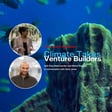Introduction to Climate Takes
00:00:13
Speaker
Welcome to Climate Takes, the Carbon 13 podcast where we ask our guests for their takes on the climate emergency and their industries and also ask what it's going to take to solve it. In this episode, it's Climate Takes Capital and we're asking what's being funded, who should be funded and the trends for the deployment of capital in 2025 to fight the climate emergency.
Meet Carbon 13: Michael and Minh
00:00:37
Speaker
I'm joined by Michael Langus, co-founder of Carbon 13 and Minh Dhillon, head of capital at Carbon 13. I guess capital um flows to the most exciting opportunities for change, right? Like where we as humanity see a potential to make a big difference and fundamentally change something.
00:01:02
Speaker
With early stage financing, it's very difficult to to kind of see through the woods as to how much capital is going to need to be deployed into these companies to get them to actually hit France, for example, it's almost often double what they raise in equity they will get in grant funding. So yeah, that's I would say also one of the strengths of the European ecosystem.
What is 'Climate Takes Capital'?
00:01:29
Speaker
There is a lot of grant funding available.
00:01:38
Speaker
Good morning, Good morning. Good morning, Sarah. How are you doing today? You're all good.
00:01:44
Speaker
um to We've chosen to name this episode Climate Takes Capital, but what do you actually think that means and where does climate capital go and why?
The Evolution of Climate Tech
00:02:02
Speaker
So i'm happy to I'm happy to kick off. So obviously this this term, climate tech, climate capital, I think over the last 10, 15, 20 years, we've seen lots of kind of different iterations of it from the clean tech bubble in the early days to how climate tech has essentially formed into this new into this new powerhouse of an industry where there's capital inflows both at the early stage but both and also at later stages as well. um It comes in many different forms and many different types of companies are getting getting funded. um And Carbon 13, I guess, as ah as ah as a venture builder, we kind of position ourselves at the very root of all of this funding. So really looking at these innovations from the grassroots level
00:02:52
Speaker
um before a lot of them have even ideated around the kind of principles that they're going to build as well. so um yeah but For me, climate tech is looking really at the earliest stage and that and that early source of early source of financing.
00:03:11
Speaker
Yeah, it's an interesting one. Like I guess capital um flows to the most exciting opportunities for change, right?
Strategic Opportunities in Climate Tech
00:03:21
Speaker
Like where we as humanity see a potential to make a big difference and fundamentally change something. And that's where climate tech is just so exciting. But maybe in 2020, 2021, 2022, there was a bit of a hype around climate tech.
00:03:40
Speaker
um And that hype isn't there as much anymore. But Calmetec is also not a one industry kind of change. right It's a horizontal strategy around every single industry that is out there. like We've been investing in things around software, making software greener, making hardware, everything from our energy to our materials greener. like It's very much a horizontal approach to everything that is out there. And it's really just a lens on how to look at strategic opportunities.
Carbon 13's Decarbonization Role
00:04:12
Speaker
And and that's why I think it's ah it's just a very long term approach.
00:04:20
Speaker
Right. So you're saying that really it's looking at the different sectors of the economy. and applying the climate lens as a horizontal to solve the difficult problems and pain points for business within those sectors.
00:04:36
Speaker
Yeah, very much. I mean, we do a lot at carbon 13 around um helping the corporates decarbonize, and that is in energy. um we We partner with um different um investors in the energy space and corporates in the energy space, but it's also things around retail. So for example, um fashion retail as well as sort of furniture retail, um food retail is all of these different sectors that have their own emission problems.
00:05:05
Speaker
And you have to remember that emission problems often translate into spending more on your energy than you have to. And also having waste products when you don't have to have them as a waste product, but they could be a valuable resource to be used in a circular business approach. And and so a lot of our startups are helping these big corporates are decarbonizing their their
Business Opportunities in Climate Efforts
00:05:26
Speaker
businesses. And that often means also saving money in their cost or actually being able to make more money with a buy So what it was the waste stream in the past and is now not no longer that? Right. So climate climate isn't just, it's not just a tick box of compliance. It's what if we can create something using 10% of the energy, which is decoupled from importing oil and gas from somewhere else. um It's not, or how do we encourage people
00:06:04
Speaker
to make moral choices.
Michael's Entrepreneurial Journey
00:06:06
Speaker
It's how do we solve the difficult problems which affect the foundations of our economies? um
00:06:15
Speaker
How have you have have you got to this, what made you want to come and Michael, I think it' starting with you first, what made you want to become a co-founding partner of Carbon 13? How did you get here? And why now have you been doing, I think we can save a half a decade.
00:06:34
Speaker
Yeah, I mean, it's been a while now in COVID-19. But I think my very first touch point with with climate tech came through actually the social impact angle where in 2008,
00:06:47
Speaker
two thousand and eight nine, I wrote my bachelor thesis on and but and how to teach environmental entrepreneurship to students in my university, and which actually then became a course being taught with a slightly different title.
00:07:01
Speaker
um But for me it was always something i want i knew i want to do in the long term and just seeing the climate crisis get worse and worse um made that it's go bigger over time um but i had a e-commerce start up i could be to be sus business and e-commerce space previously.
00:07:20
Speaker
And actually, that gave me a lot of insights on how to build a business, what it takes to build a good sales team, and so on. and We raised a lot of money from different investors. So it really was helpful for me to build my um so network.
00:07:34
Speaker
um But then, yeah, that itch just became bigger and bigger. And I, at some point, just realized I had to leave that business. um I was able to sell some of my shares in a secondary, which was a great start to doing investments.
00:07:49
Speaker
um So I was able to do some engine investments and then, yeah, met very luckily the come for team early founding team. So I'm very excited to join
From Social Impact to Scalable Solutions
00:07:58
Speaker
that. That must have been a nice champagne moment as well.
00:08:03
Speaker
and and And also your, you know, your journey here, I think proves another point about investment in climate tech. Many of us have been in this for decades and the problems are really actually quite well understood.
00:08:20
Speaker
but It's actually a case of scaling the solutions, which are, yes, there's technical ah complexity in that, but a lot of this is a business problem. It's a
Minh's Motivation and Impact
00:08:31
Speaker
scalable problem. It's a commercial problem to solve. um we're not Investors in climate tech are not new to this. This is not a bandwagon they've jumped on in the last two to four years where climate tech suddenly exploded that we saw.
00:08:45
Speaker
um And Mint, how about yourself? You know, you're working day to day with a lot of carbon-13 invested community from angels to to VCs um and more. ah what's what when you When you're getting up in the morning and seeing your diary, what makes you go, oh, I'm really looking forward to that, apart obviously from recording a podcast episode. No, of course. it's ah It's an interesting question, how you phrased it as well. And it's probably something that we should all give a little bit more thought to what makes us kind of get up and excited about our jobs.
00:09:16
Speaker
um But yeah, I mean, I came into it um through working through several we working in startups for kind of 10 to 15 years before um Carbon 13, holding fairly senior positions and kind of working on go to market strategies for quite a few different places.
Challenges in Deep Tech vs. Software Startups
00:09:32
Speaker
And like a lot of people who have either been in the industry for 20 years or become fairly new to the industry at some point, there's always a point of entry. And that point of entry usually comes because there's some association with wanting to have a career that has impact at its focus as well. And I think regardless of the type of work that you're doing at something like Carbon 13, whether it's working directly with the ventures, whether you're more kind of operational on how the business is run, or whether someone like me who's speaking a lot to investors, the core kind of, I guess,
00:10:13
Speaker
work and an idea of working in those different areas. and And what kind of gets me up in the morning is knowing that there is a lot of impact being done through um the work that I'm doing, through connecting angels, the value propositioning around what these angels want, and really how to kind of go out to them as well. So yeah, knowing that these companies are funded, I guess is a good, a good win.
00:10:39
Speaker
Climate tech attracts people who want to work on some of the hardest problems, and that's very energising to work with those people.
Defining Deep Tech
00:10:48
Speaker
i' Talking about difficult, complex problems, when we talk about climate tech, I think something that's not ah sufficiently well understood is we're actually often talking not about software, but about what you would call deep tech,
00:11:05
Speaker
And that can sometimes be a misunderstood term. How would you define, what do we mean by deep tech, science led ventures, IP led ventures? What do we mean by that?
00:11:17
Speaker
Yeah, that's a good point. I mean, it's quite, um I would use some of these interchangeable and even though they, I think they have a similar core and then they have slight differentiations. So science-led and deep tech and maybe what people also say frontier tech. I think what they always mean is that there's a considerable science risks. Can you actually do this in this way? Is this possible? Oftentimes that means there's university research or other academic research. There's um intellectual property being generated and often also protected through patents.
00:11:56
Speaker
And that kind of research, I think, is just an amazing opportunity um for Europe um as we have some really great universities.
Deep Tech Startups in Carbon 13's Portfolio
00:12:07
Speaker
and We're not always that good at sort of commercializing that research. And that's, again, another opportunity for maybe companies like Carbon 13 and other VCs that are increasingly looking at that.
00:12:18
Speaker
um but yeah I would say overall, it's it's something that is that is really considerably new where you don't know can this be built. I think in a lot of software businesses, the question, can you build this, isn't really one that people ask anymore, especially now ah nowadays with AI engineers coming up and ah Meta saying they will have almost no mid-level engineers anymore because everything we've built by an AI.
00:12:45
Speaker
but some Yeah. So it's that, can it be built? ah at At its most simple boil down to the bare bones, when you're talking about capital, you're funding either how you overcome technical risk or market risk. And I think with deep tech, the question is, there's more technical risk. But go, if you overcome that,
00:13:11
Speaker
the hope usually is that the market demand is strong enough that that it will make sense. um Could you, ah let's let's illustrate this specifically. Do we have a couple of specific examples of startups that you would call Deep Tech?
00:13:28
Speaker
um So there's definitely, there so so there there's a couple within the Carbon 13 portfolio. And just to touch on what Michael was saying as well, it's such an important point, the idea of these universities spinning out these kind of ideas through through a lot of research as well. And I guess, coupled with that, there is this big trend that we're now seeing towards a deep tech VCs and propriety innovation as well. So actually looking at these VCs, you know, big VCs like IQ Capital or atomic Atomico, which are having mandates to look at this kind of technology specifically as well.
00:14:06
Speaker
um And it's important, it's ah it's an important sector to to look at as well. um There's a couple of really interesting startups actually, especially in the kind of more AI related a space for um for Carbon 13, one which is using robotics, actually Samudra oceans.
00:14:28
Speaker
So robotics is an interesting space, obviously with with AI, because um powered robotics and automation is you know a big key part of AI and its mobilization as well. um And they're using seaweed, they're doing seaweed farming. So they're using autonomous robots ah for kind of real time decision making as well. So that's um one company that's leveraging ah robotics in this AI space as well.
00:14:55
Speaker
There's a couple of others, um but maybe Michael, you want to touch on one as well? Yeah, I'm going to pick a startup from our German um programs um called Differential Bio. um they They're still sort of in in stealth mode, so and the announcement will come soon, maybe in light of this podcast.
00:15:16
Speaker
um They are an AI business or a business that's using AI to create digital twins of um processes in the biotech space. So they will help companies, for example, vegan cheese companies to optimize the way they make experiments so that they can be faster at scaling their operations. So one of the problems in biotech is still that lab work is very manual. right like Somebody tries out something and that you can scale it by having more um sort of people in a lab. But that's a very sort of linear way of scaling your operations or your R and&D.
00:15:58
Speaker
um and AI just and the ability to create a digital twin of this process and being able to predict and sort of learn ahead like what could be the iterations of the kind of grow medium to use or the kind of yeast strain to use um can really help these kind of companies to get a lot faster in the way they they operate, but also in the way they um go to market and scale their businesses and therefore build um valuable businesses in the, for example, vegan um vegan cheese space or like a lot of different spaces like um in the climate tech space as well as in the pharma.
From Research to Commercialization
00:16:39
Speaker
So yeah, very exciting business and we're very excited to have them part of our portfolio.
00:16:47
Speaker
Let's look at the journey of a deep tech startup and the capital needs that that startup is going to need. So you're a researcher at a university and you've you've produced research and you think there's something in it in it here. What are the stages that that research or the founding team of that IP needs to go through to raise capital to get to the next step? What's the next step? What's the capital?
00:17:14
Speaker
and And I'm asking this question because that journey already looks very different to your traditional software VC route, right? Where you build an MVP, get some traction, raise money, get a flywheel going, la, la, la, la.
00:17:35
Speaker
a Yeah, sure. So I think some of the points have really been touched on as well. um One of the main things is obviously, is you as you've just rightly said, Sarah, is that a lot of the innovations that are being built in this deep tech space, it's really for us at the stage we are, especially at Carbon 13, is to really have a strong founding team to know that what they're going to build is actually possible as well. We know that deep we know that the climate emergency is going to take these deep technologies in order to actually have some
00:18:08
Speaker
you know, impact in this space as well. By having a strong founding team at the very beginning is one of the core kind of measures of knowing whether they're going to be able to create this technology or not. And I guess post that is looking at the IP. Is this something that we'll have? um What kind of IP is based around this technology? um And how can we lean into that as well?
00:18:36
Speaker
A lot of these companies are not going to be market ready for quite some time. um Software companies typically might see exits in three to five years. A deep tech company might see an exit in 10 plus years. So it's really just looking at the gaps we can fill in between the time that it takes to scale to the that that point of exit.
00:18:56
Speaker
And even at that point of exit, a deep tech company looks very different. The software company, you know, it's not your typical IPO, it's largely going to be an acquisition from a from a corporate or at least a partial acquisition and maybe a licensing play, for example, as well. So that's quite a fundamental change there.
00:19:16
Speaker
Yeah, maybe I can just add one thing. I think this is exactly where carbon 13 plays, is this sort of somebody has an idea in a lab, in a research environment, um and then what what do do we do next? And there's obviously in different countries, and for example, in Germany, there's actually quite a lot of support for that very early It's called the EXIST program, you basically get money from through the university to do more research. And then during that time still, what you're missing often, and that's where carbon-13 can really help, is like what Min said is this, um bringing in your commercial co-founders, bringing maybe somebody with industry experience,
00:20:00
Speaker
that can help you scale this thing long term and that's where we come in but traditionally i would say and the problem fundamental or fundamentally the problem is that you need a lab you need to be able to have access to a lab that is often not even.
00:20:16
Speaker
The difficulty isn't ah necessarily, can you pay for it? Because also when we give money to to startups, they often it takes some time to
Grant Funding's Impact on Startups
00:20:25
Speaker
find a lab. So being able to to know, okay, in this place, I can find a lab or you can go back to your university where you maybe have done your PhD. So there's a lot of like,
00:20:35
Speaker
sort of network building and helping you and navigate this ecosystem um and then yeah long term there's obviously debt financing involved and i would say a lot of our startups and get um in the uk innovate uk grants or in other countries there's other versions of that um it's about.
00:20:57
Speaker
50% on top, I would say, on top of the equity funding that they raise. In some countries, I and know in France, for example, it's almost often double what they raise in equity they will get in in grant funding. Yeah, that's, I would say also one of the strengths of the European Acquisition Center, there is a lot of grant funding available um that can help you in these early days to sort of de-risk some of the R and&D that you have to do.
00:21:23
Speaker
So let's just summarize this because this is this is quite different to software investment. We might expect to see up to half of the startups in the UK and more in in France have grant funding for the work that they're doing. um We're expecting a ah much longer time interval until an exit, so 10 plus years.
Assessing Deep Tech Progress
00:21:47
Speaker
um How does that change the mindset of an investor?
00:21:56
Speaker
Well, what kind of investor are you thinking about? Well, um anything from you're an angel investor and you think that this ah team is working on something really, really exciting, but then you're like, OK, this is going to be a 10 plus year return. And then when you're venture capital, because DeepTech is like 20 percent of venture capital, roughly.
00:22:18
Speaker
how, again, are you telling that story to your LPs? um And how are you how are you having the confidence to lay those lay those bets, basically? You're not going to know if you're right for a long time. I mean, I would disagree that you don't know if you're right for a long time. Like this, obviously, you can tell, I mean, we can tell,
00:22:42
Speaker
um quite fast, you can say, okay, which of the startups are doing really well, right? Like we, we definitely have in our portfolio, I would say six to 12 businesses that are doing very far well and moving very quickly. Um, and there's a lot of, um, partnership building. There's a lot of sort of, um, building of a movement that is happening with, with teams very early on. Like we, if you look at a team like NEOM in our portfolio,
00:23:12
Speaker
They're not in the market yet, as in they haven't reached reached industrial scale any yet, but they are building a movement around building people around them that really believe in the business, that um have invested in the business, that want to partner with the business. um Same with other and teams that have been on this on the podcast already. like um cocoon carbon where you can see they're clearly moving faster and moving very quickly towards a really interesting space. um so Can I add as well? as not just so It's not just the business, right? So it's ah it's the sector. There's this focus on these kind of hard to decarbonize sectors. And if these sectors as as a sector don't decarbonize,
00:24:02
Speaker
then we're in we're in all sorts of problems. And so these startups, even though there is a long lifecycle to getting them towards you know profitability and all these different hurdles, you know they're not bigger hurdles, they're just very different hurdles to a software company. um you know The fact that these problems exist, these startups will always have a have a place or should always have a place in solving them.
00:24:26
Speaker
And they're the most significant sectors of the economy, right? Something as fundamental as the making of steel, solving the intermittency of of solar and wind. It's how the stuff you need to make the car, right? We're not talking about something something fringe here so we're looking at do so the metrics that we're looking at is the progression through the technical roadmap it's the relationship and stakeholder building that we want to see that's when we start to get excited is that a right summation i mean
00:25:09
Speaker
I would say, I mean, obviously in startup land, one of the main proxies, one of the early proxies to you that we get as an early stage investor is more interested from other investors, right? Like there is a, in in startups, there's a very sort of clear ah ladder of the size and type of investor that you go through. And um we obviously, Minh gets a lot of these emails and me as well.
00:25:38
Speaker
um from follow-on investors that say, hey, do you have any interesting startups? Or, hey, I've seen so and such, and then could you make an introduction to us? um And I think that, I mean, that goes on for a while and you you can, it's it's a proxy for success, obviously, because in the end of the day, a startup is there to also be um making a change and really create value for
VC Returns and Early Exits
00:26:02
Speaker
their customers. And at the end of the day, that's the long term.
00:26:05
Speaker
and that measure of success, but maybe with these startups that don't have the ability to um deliver a product early on, this interest of investors and being sort of um seen as a you know as a chain as a change agent in ah in a space um that also means, for example, being invited to conferences to talk and and give um give you a viewpoint on a certain industry.
00:26:32
Speaker
um yeah I think there's a lot of different proxies, but in VC interest and VC funding of later stage investors is obviously one where as an early stage investor, in some cases that might even mean that we would be able to have an exit earlier, like secondaries in 2024.
00:26:54
Speaker
were ah still a ah big part of how some VCs got liquidity. And as we are an investor that comes in with with our angel investors in the UK, we come in at the very earliest point. um We could then make a 20 or 30X return already at a Series A um and therefore have already a very good return for a startup that we've invested only maybe three to five years in earlier.
Deep Tech Collaboration with Corporates
00:27:24
Speaker
Okay. And we've spoken about investors and we've spoken about, you know, they might be VCs. I think let's move actually to the other side, which is more to the potential customers of these deep tech ventures. Because when we're talking about capital,
00:27:48
Speaker
who better to spend that than on a potential customer of a deep, deep tech venture? um you Could you talk a little bit to how these ventures are working with corporates and also therefore the role that they're actually playing within ecosystems of investors such as ourselves?
00:28:12
Speaker
I mean, i'm um'm happy to I'm happy to kick off. So trying to think of a good example of a portfolio company as well. So someone like Materials Nexus or Matnex as they've been um ah rebranded. This is a ah platform for materials discovery. So it's pretty out there stuff. It was led by a CEO, Dr. Jonathan Bean from Cambridge University, holds a PhD in physics there.
00:28:43
Speaker
And they were one of the first teams that were on the cohort for for Carbon 13. And this space, obviously, that they're building in, um using AI to discover a lot of these materials, it has a whole range of different applications across multiple different industries as well. And so if you take a corporate like, for example, DuPont,
00:29:11
Speaker
who would have these large R and&D centers that are very traditional and very slow moving. They are also looking at the types of innovations that you know something like Matnex could be building, and how can they how can they speed up their R and&D in in their processes like these kind of companies as well. So Matnex really can take a place in these really old, I guess, slightly more iconic corporates and actually innovate and look to build materials in a much quicker and faster and more efficient way as well.
00:29:45
Speaker
um still early days, but they're having quite a lot of good progress as well. It's actually a really interesting example of, again, this sort of interplay between AI and hardware, deep science and and climate tech, where you're using AI to fundamentally change an industry and make and something that has and been happening. Obviously, R and&D funding materials has happened
Corporate Influence on Ventures
00:30:11
Speaker
for a long time, but really,
00:30:13
Speaker
um like power charge that um I mean they last year announced one of the first materials to be invented by humanity um a rare earth free magnet um that can be used for for example wind turbines um or any kind of um where we want to create power out of out of movement um So it's a very exciting start-up with a very exciting mission and they're combining a lot of these trends and um yeah then very successful with working very closely with different corporates who then would power would then be their customers. Corporates are definitely thinking about this really strategically. um For example you might have the likes of
00:31:03
Speaker
Barclays Eagle Labs, who are a partner of our accelerator, the the Venture Launchpad, applications for the opening soon actually, um and they really want to provide a seedbed for high potential climate tech within the yeah UK, that's part of their mission. um But, you know, we work with other partners in different ways. ah Siemens Energy Ventures, based in Germany, their strategic objective, well, they've got they've got several, but
00:31:36
Speaker
you know, as investors, what they've done is contribute to supporting female founders with bursaries and other support mentorship, et cetera, to start filling that pipeline of high potential female founders because they exist. The the women are there. um There's just extra challenges to overcome where that kind of input can really help. So these corporates can really influence from the beginning ah the outcome over the next five to 10 years about the kinds of ventures we're seeing and the kinds of people that that are building them. you know At its most basic, it's unusual for a PhD hot off the press from a university to be able to sell fund for years developing something, right? So bursaries can make a difference and and pay their pay their sandwiches for for for the time they need to to develop it.
Supporting Deep Science Ventures
00:32:25
Speaker
um And I think when we look at
00:32:31
Speaker
deep science, science led ventures. Just the the width of the ecosystem needed to support these ventures. They just need so much more support more than the software ventures.
00:32:44
Speaker
um you know carbon-13 we've got hundreds of domain experts who are experts, you know they might be an expert in hydrogen or or ah the built environment and it's about trying to get the founder to speak to the right person at the right time to solve the problem that they need to solve right now. ah just the support the The capital needs to fund this huge support network from the very beginning and it changes the paradigm of the deployment of capital because it's it's It's not just, okay, you have some money. it's It's the epitome of smart capital for for deep science ventures. And we see that with our angels, right? is they often want to They want to contribute. They don't don't just want to to give money. They want to contribute to the problems that are being solved, right?
00:33:32
Speaker
Yeah, and we're very lucky in that respect to have the kind of ecosystem that we have here at Carbon 13, where we have these hundreds of just a touch on what you've said, these hundreds of domain experts that we can really lean into that have these, you know, technical knowledge in every very weird and wonderful specific ah field as well. So yeah, very, very lucky to to be able to rely on those domains. There's also a um but like A lot of a lot of um angels have you know gotten into the angel space maybe in the last 10 years. A lot of founders that have built software businesses um and have been successful investing in in SaaS businesses essentially over the last 10, 15 years.
00:34:25
Speaker
And um ah a lot of them don't have an ecosystem ah in the academic space and they don't necessarily have experience in building hyper businesses themselves. So we do see this sort of inertia of um angel investors and family offices going from the sort of pure normal software space to investing in in climate and in hardware and deep tech.
00:34:47
Speaker
and It's something that we're also trying to help change, so if anybody is out there and keen to engage more with with Climate Tech Ventures, we're always open to to bringing you in into the cohort.
Sharing Knowledge in VC Industry
00:35:01
Speaker
um In Germany, or more specifically in Hamburg, we've co-organised or co-founded a um thing called the deep tech club um which is a um the other co-founding partners are Hamburg City ah innovations as well as a few of the local angels and family offices and it's it's about sort of knowledge sharing it's about bringing in or sort of sharing some of that knowledge around how do you actually judge a early stage deep tech startup like how can you tell this will be successful.
00:35:34
Speaker
Or how do you help those startups long term? Like, what's the best value ad that you can offer them? I think that's just a lot of learning that um the VC industry as a whole um is doing still in some of the sort of scaling up of these deep tech ventures. And that's where corporates who have been doing this for a long time, like Siemens Energy Ventures has been building energy plans for a long time. And um there can be this great sort of interplay between corporate VC um as well as sort of corporate R&B teams, as well as um academics, as well as VC and angels.
VC Industry Predictions for 2025
00:36:11
Speaker
So yeah, I think it's a very exciting space for that reason. Where do we see where do we see that VC industry going in 2025?
00:36:24
Speaker
um yeah i mean i think I think I would look back um just briefly because sure what was interesting in 2024 is that you obviously had a huge surge of AI. um like Most deals and that were made and most of the growth rounds were really focused around AI, especially in the US.
00:36:45
Speaker
But you had an overall decrease of VC funding globally, and which is interesting. And a little bit was driven by a decrease of investment um sort of in China and then also in the US. um I think in the UK, there was also an overall decrease, but climate tech actually had a surge. So 24% more investments in climate tech. And in AI and climate tech was actually 128% increase.
00:37:12
Speaker
um At the same time, in Europe, you had um sort of the climate tech industry still had the top spot of investments, while overall, there was a decline again. I think in 2025, there's probably AI will still be a very big topic, right? um We will see a lot of the teams. And really, I think for me, the interesting thing about AI is that it feels a little bit similar from a conversation like mobile. Like when I built my first, my so my last startup in 2010, everything was mobile, right? Like everybody was building mobile apps. Everything you had to do was mobile.
00:37:52
Speaker
and And it's not like mobile has gone away, right? like Most of us look at our phone ah thousands or or at least hundreds of times a day. We spend hours of of our day on our mobile phones. So mobile itself hasn't gone away, but it isn't as much of a topic for investment anymore. And I think over time, we'll see something similar with AI. like It's now a big type of investment, but over time, it will just be a fundamental layer of everything that we do.
00:38:20
Speaker
So our startups, we do tell them a lot that they have to look at how do they use AI and how do they build with AI.
AI's Role in Climate Tech
00:38:28
Speaker
um So yeah, 2025 definitely still a year of AI, but hopefully also we see some up rounds from from ah some of the startups we've built um and climate tech generally being strong as it was in at least in Europe last year.
00:38:46
Speaker
And I guess just to just to add to that as well, I guess we've talked a lot about um deep tech and AI applications and growth and capital and deep tech as well and the importance of it in the space, but that's not to say that it doesn't have its place in in software as well. AI is very much transforming software and software defensibility as well, um especially within that kind of product lifecycle management space.
00:39:16
Speaker
So there's always these kind of continuous improvement loops which are powered now by ai so you get this almost real time um optimization and feedback something which was never be able to done before so having the shift to these kind of self improving platforms.
00:39:34
Speaker
is really just enhancing the defensibility of the overall space. And again, there's companies within our portfolio that are looking at that as well. So just have a look at something like Pre-Optima, which is using AI-driven ah product lifecycle management as well to kind of evaluate the whole carbon impact of its um of its design of buildings. um So yeah. I'm very excited for one of the next episodes where we're talking to Infios.
00:40:03
Speaker
um who are doing, that's supply chain is exactly what you've said, supply chain for battery materials in particularly energy storage. um And from a climate challenge point of view, so my final question from a climate from a climate point of view, where should more capital go? And for context, the bulk of investment into climate technologies is probably still energy and transport.
00:40:36
Speaker
Yeah, I think energy i mean energy was one of the biggest spaces in 2024 and it will likely be in 2025. There's just so much to be done. and what Also, yeah Sarah, you said earlier about actually scaling and sort of financing and rolling out the technologies that that we need.
00:40:53
Speaker
like We all need, like we know that the right thing for everyone with a house is to have solar on the roof, to have a battery charger and connected to a wall plug for your electric car and a heat pump. right like that there's this sort of We know that that's the right model because it will save you money long term. Probably you'll do some kind of insulation in your house as well. But like there's that bit which will make you money in the long term and will make you ah save
Funding Complex Climate Technologies
00:41:20
Speaker
money. like I recently spoke to a taxi driver who has a war plaque and that whole setup in his house. And he said for his taxi, and he's got eight taxis, sorry, eight taxis, he's saving 2000 pounds a month on the taxi that is charged through the system, and both at work and at home. And it's very exciting, right? Like the kind of opportunities that you get from from that. So rolling that out and and doing more also in industry around electricity and energy will still be a big topic.
00:41:53
Speaker
um I think overall there's um something like yeah I strongly believe that that we can do and that we will work on I think there's a lot of.
00:42:05
Speaker
potential in agriculture, it's a very difficult space and to decarbonize. But yeah, I think B2B opportunities are wide and large in climate and founders should look around and try to engage with corporates and their sustainability goals and see how they can actually help to make them go faster on that.
00:42:31
Speaker
Yeah, I mean, i guess I guess for me, so some of the areas that we've touched on is looking at certain technologies and why and and the difficulty in actually having them funded because they are complex technologies. So I think it's taking these complex technologies in really heavy, hard to abate sectors. So taking something like heavy industry, like cement, steel,
00:42:57
Speaker
chemicals, all of these industries that have a massive carbon footprint, but with early stage finances, it's very difficult to to kind of see through the woods as to how much capital is going to need to be deployed into these companies to get them to actually hit that that those impact goals that we would expect or to actually create a dent as well.
Community Collaboration Invitation
00:43:18
Speaker
um So those hard to abate sectors, I would say. And again, have a look at some of our portfolio companies working in this space, like Cocoon Carbon, um who are kind of looking at green cement and ways to um make the production of these different materials within um the built environment a real thing.
00:43:37
Speaker
so Amazing. Thank you guys i for anyone listening to this. um I strongly encourage you, if you've been interested by any of these topics, you're very welcome to reach out to us to talk about supporting the ventures, working with the ventures, ah or building your own venture. You're very welcome to to talk to us. we're We're an open community. We're very friendly um and we want to help the whole ecosystem.
Conclusion: Climate Tech Landscape
00:44:04
Speaker
And I think when we look at ah what we've discussed today. I think we can say that climate takes deep science led ventures, ah climate takes patience and a longer rate of return to the exits and a more complex capital stack to fund it, climate takes
00:44:27
Speaker
a much bigger ecosystem to support each venture from investors through to experts, through to corporates, through to research bodies such as universities. um And climate takes capital to solve these ah challenges that humanity is facing. ah Thank you very much for listening. um See you next time. Thank you.











